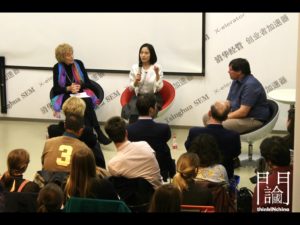

SPEAKERS
Mary Evelyn TUCKER, Senior Lecturer and Senior Researcher, Yale University; Director of the Yale Forum on Religion and Ecology
Wu Ruihan, PhD candidate, Department of Philosophy, Peking University
VIDEO INTERVIEW (published on our YouTube channel)
REPORT
The word “environment” implies something outside of ourselves – something that surrounds us but is not a part of us. Modern science has also tended to create a distinction between humans and the ecological processes being studied. However, in a world of multiplying ecological challenges, Mary Evelyn Tucker, senior lecturer and researcher at Yale University, believes such a detached viewpoint is insufficient. Her work challenges this distinction between human and environment. As a pioneer in the field of ecological humanism, Tucker’s current project draws on both evolutionary science and the wisdom of world religious traditions to inform a new model of ecological stewardship. This project is, in Tucker’s words, “an intergenerational handshake” to a younger generation who will inherit the monumental task of reviving and revitalising a dying earth.
The field of ecological humanism is only about 20 years old. Beginning in the mid-90’s, Tucker and her colleagues wanted to find a new way to contribute to the growing discourse on Asian modernisation and the environment. They realised that although 85% of the world’s population identify with religious beliefs or at least “cultural religion”, the traditional wisdom of these traditions has been largely ignored by modern science. Aside form the institutional power of some religions, why are religious traditions so powerful? What have they done for us as humans? From an ecological perspective, Tucker believes religions have grounded humans in the earth and earth processes. Notably for the ThinkINchina presentation, Asia religions like Buddhism, Confucianism, and Daoism have sensibilities about the interconnectedness of nature. It is only recently that ecologists have begun to uncover empirical evidence of what these religions have always suggested – an immense intelligence and interconnectedness of nature.
While religions can often be problematic, their values and traditions are a rich well-spring of knowledge about how to care for the earth in an increasingly modernised world. They orient humans to something larger than themselves, ground them in earth processes, nurture them through festivals which celebrate food, water, and other life sources, and transform them with ethical principles. They teach humans how to live their lives and how to contribute to their communities. By connecting religious leaders with scientists and policy makers, Tucker and her colleagues hope to “midwife religions into modernity to deal with current [ecological] problems.”
The field of ecological humanism is not just abstract. Over the past couple decades, the project has expanded beyond Asia to organise a series of conferences between scholars and religious leaders from all around the world. These conferences led to the publication of 10 academic volumes over 7 years. During this time, Tucker and her colleagues have seen huge interest and engagement, including from environmental scientists who realise their facts and models are insufficient to address ecological challenges without including ethics and humanities in the conversation. At the same time, religious figures like Pope Francis have begun using spiritual language to preach ecological messages like rainforest conservation in Brazil.
Returning to the original source of inspiration – Asia modernisation and the environment – Confucianism has been a particularly good starting point for ecological humanism because its cosmology already considers human, earth, and cosmos as one. This three-way unity has sometimes been playfully called the Confucian “trinity”. In this relationship, the human is the heart – “xin 心” – that completes heaven and earth as a co-creator of their ecological processes. As Peking University PhD candidate Wu Ruihan said: “[Confucianism] doesn’t only mean to see yourself as part of the cosmos, but also that the cosmos is a part of you.”. These ethics are communal, encouraging people to care for the earth as they would care for themselves because, in fact, they are the same. Through self-cultivation, one comes into resonance with the earth and all its interdependent forces.
Reconnecting with the earth and its processes benefits humans beyond surface level ecological stewardship. According to Tucker, separating humans from religious ethics and cosmology has led to a sort of “schizophrenia” among students who constantly search for meaning and purpose. Tucker’s second project, The Journey of the Universe, is an Emmy award-winning film that tells evolutionary history as “a story in which we have a role, a part, a place.” In much the same interdisciplinary thread as her team’s first project, the film pioneers a new genre that bends modern science and a focus on human purpose and meaning to create “a new cosmology.” It attempts to imbue viewers with a new-found sense of purpose from an evolutionary standpoint.
These two interdisciplinary projects share the common goal of creating a new ecological consciousness that is filled with meaning and purpose and grounded in modern science. Although the bridge building between religious ethics and modern science is a monumental task, Tucker believes it is an essential one. “I still have a lot of idealism… we have to imagine positive futures for ourselves” said Tucker. The hope is that by identifying common values, ideals, leadership, and persistence, humanity can reverse some of the worst ecological crises and move toward a more ethical, purpose-driven society.
If you’re interested in learning more about professor Tucker’s project:
Yale Forum on Religion and Ecology
Report written by Daniella Silva
Video edited by Martina Poletti